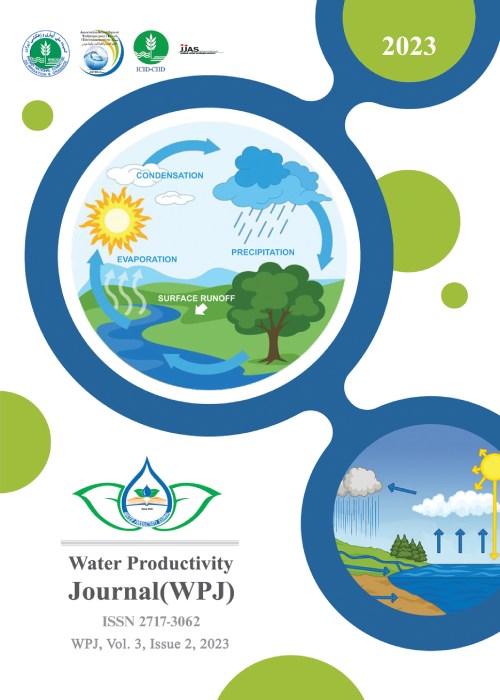Waghad model of community participation in irrigation water management and sustainable returns, India
Author(s):
Article Type:
Research/Original Article (بدون رتبه معتبر)
Abstract:
Introduction
The Government of India has been promoting, Participatory Irrigation Management (PIM) by way of formation of Water Users' Associations (WUAs) in many irrigation schemes, with the objectives of achieving improved operation and maintenance of irrigation schemes, improved water use efficiency, improved crop productivity, reduced water conflicts thereby ensuring sustainability in irrigation development and management. For smooth transfer of management to WUAs, various states have made their own legal provisions and Acts in India. Maharashtra State has long experience of community participation in irrigation management. Phad (Block) System and Malgujari Tank System are the best historical examples of the participatory & sustainable irrigation management systems. After 1985, Government of Maharashtra deliberately took keen interest in the formation of water users' co-operative societies / associations. Operation and maintenance of the distribution system is done by those associations themselves. After 2005, Maharashtra Government passed a special Act viz. Maharashtra Management of Irrigation System by the Farmers Act, 2005 for promotion and formation of WUAs.Materials and Methods
The main objective of this research work is to study community participation in irrigation water management for sustainability of the farming business in the state of Maharashtra, India. A case study of Waghad irritation project has been selected for detailed investigation. Waghad irrigation project is located in the tribal area of Nashik district of Maharashtra, India. Waghad irrigation project is a unique case in which complete control of management, operation and maintenance has been transferred to the federation formed by 24 WUAs existing in this project. This federation is the apex organization called Waghad Project Level Water Users' Association (WPLWUA).Results
The study reveals that the cluster of WUAs of Waghad project is supplying equitable, judicious, timely and assured water to farming community, which is the result of an innovative and sustainable irrigation management transfer. It builds up a sense of responsibility amongst the farming community. Beneficiary farmers are taking multiple and varied crops according to their own preferences. Water is distributed on volumetric basis rather than on area basis from tail to head. The construction of water conservation structures in command area has resulted in recharging wells which led to conjunctive use of water. The assured water supply has an in built incentive to promote micro irrigation techniques, which has led to improvement in water use efficiency as well as crop productivity in the command area of the project. Apart from the equitable distribution of water WPLWUA has been entered in diverse agri-business activities which lead to employment generation, value addition in agri-business and raising farm return and bringing sustainability in agriculture. This community managed project brought sustainability in farming business. Waghad model of community participation in irrigation water management is very successful and have got several state and national level awards for participatory irrigation management, operation and maintenance of irrigation system in India.Conclusion
The Cluster of Water Users Associations of Waghad project are supplying equitable, judicious, timely and assured water to farming community that results into innovative and sustainable irrigation management transfer. The project level associations of Waghad saved about one-third water supplied for irrigation apart from increasing productivity. This water has been used for additional area under irrigation. Waghad project has developed good rapport and coordination between various institutions involving in irrigation management. This innovative participatory water management model of Waghad project can be replicated in different part of the country and also in the world.Keywords:
Language:
English
Published:
Water Productivity Journal, Volume:3 Issue: 2, Spring 2023
Pages:
49 to 60
https://www.magiran.com/p2705808
دانلود و مطالعه متن این مقاله با یکی از روشهای زیر امکان پذیر است:
اشتراک شخصی
با ثبت ایمیلتان و پرداخت حق اشتراک سالانه به مبلغ 1,390,000ريال، بلافاصله متن این مقاله را دریافت کنید.اعتبار دانلود 70 مقاله نیز در حساب کاربری شما لحاظ خواهد شد.
پرداخت حق اشتراک به معنای پذیرش "شرایط خدمات" پایگاه مگیران از سوی شماست.
اگر عضو مگیران هستید:
اگر مقاله ای از شما در مگیران نمایه شده، برای استفاده از اعتبار اهدایی سامانه نویسندگان با ایمیل منتشرشده ثبت نام کنید. ثبت نام
اشتراک سازمانی
به کتابخانه دانشگاه یا محل کار خود پیشنهاد کنید تا اشتراک سازمانی این پایگاه را برای دسترسی نامحدود همه کاربران به متن مطالب تهیه نمایند!
توجه!
- حق عضویت دریافتی صرف حمایت از نشریات عضو و نگهداری، تکمیل و توسعه مگیران میشود.
- پرداخت حق اشتراک و دانلود مقالات اجازه بازنشر آن در سایر رسانههای چاپی و دیجیتال را به کاربر نمیدهد.
In order to view content subscription is required
Personal subscription
Subscribe magiran.com for 70 € euros via PayPal and download 70 articles during a year.
Organization subscription
Please contact us to subscribe your university or library for unlimited access!


